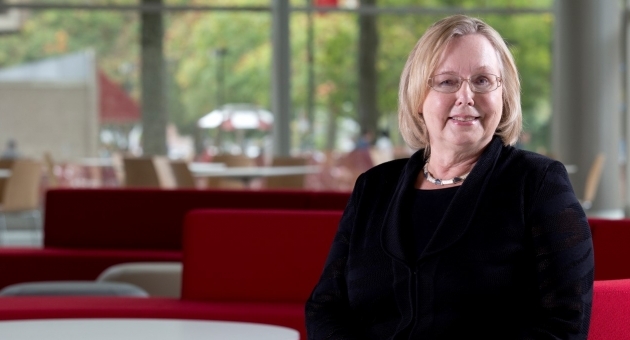Raise Your Hand: Questions for a Temple professor

Physics Professor Marjatta Lyyra loves to explore. From riding bikes as a kid in Finland to sailing with her family to her work in her lab at Temple, she is invigorated by adventure and always up for a challenge.
How did you become interested in science?
I grew up with five brothers and observed what they did. So when the bicycle chain came off, I flipped the bicycle over and put the chain back on. I learned to fix things.
In high school I wanted to become a veterinarian, but I’m allergic to animals; the thing I liked next best was physics. And in college I thought the most fun people were in physics. That was a big factor in my decision: Do I want to hang out with these people for the rest of my life? My research group is like family.
What is your research group working on?
We study the interaction of light with matter, which is called quantum optics. For example, we are working on electromagnetically induced transparency. If you want a signal to be sent so that it won’t be intercepted, you create a transparency in a medium with one laser beam to prevent the absorption of the signal, which is transmitted by a second laser. This could be used in security and communications systems and remote sensing.
You teach in addition to doing research; what do you most enjoy about teaching?
A few years ago I ran into some Temple alumni in Barton Hall who were looking for Room 140. I asked them why, and they said because learning physics was like torture, and that was the room where they were tortured in college.
There is a lot of fear of science among students, and my goal in teaching is to take the fear out and help students do better than they ever thought they could.
As I’m sure you know, women are underrepresented in physics both in school and in the workforce. What do you think is the best way to interest more women in science?
Over half of my PhD students have been women. If we raise the number of female faculty in physics, it is much more likely that female students will come, stay, graduate and get jobs. Female mentors really make a difference.
It is also important that women feel it is possible to have a career and family. More daycare facilities on college campuses would be valuable to both female and male faculty and graduate students.
And it’s getting students exposed to the excitement of science early enough. My high school physics teacher had students help him prepare experiments each week. We were young, laughing, wondering if the experiment was going to explode—the teacher made science exciting!
What do you do for excitement when you’re not doing science?
I love to sail. While in graduate school in Sweden, I also earned a deep-sea skipper’s license. My husband and I met through sailing, and our children started sailing with us when they were babies.
But science is really, really exciting, and I can’t wait to tackle new problems. My work is also my adventure.
-Kate O’Neill